Table of Contents
Agro business of garlic peeling :

Agro business idea of garlic peeling business idea, here in this agro business , The garlic peeling business involves removing the outer skin of garlic cloves for sale to food processing companies, restaurants, hotels, and retailers. Peeled garlic has high demand in the food industry because it saves time for chefs and food manufacturers.
Where to sell:
- Supplying to Hotels & Restaurants – Bulk sales of peeled garlic to food businesses.
- Selling to Retailers & Supermarkets – Packaged peeled garlic for grocery stores.
- Wholesale to Food Processing Units – Large-scale supply to food manufacturers.
- Export Business – Many countries import peeled garlic for their food industries.
- Garlic Paste Production – Value addition by making garlic paste for higher profits.
Investment Costs:
- Small-Scale Business: ₹50,000 – ₹2,00,000
Profit Calculation:
- Raw Garlic Cost: ₹20 – ₹40/kg ($0.25 – $0.50)
- Peeled Garlic Selling Price: ₹80 – ₹150/kg ($1 – $1.80)
- Profit Margin: ₹40 – ₹100/kg ($0.50 – $1.25)
For example, if you peel 500 kg/day with a ₹50/kg profit, your daily profit = ₹25,000 ($300). Monthly profit can reach ₹7,50,000 ($9,000) if demand is stable.
Aloe vera business :

The Aloe vera business idea is a powerful opportunity in today’s wellness-driven market. It’s used across cosmetics, food, pharmaceuticals, and wellness industries, making it a high-demand, low-maintenance, and scalable business.
Products Manufactured from Aloe Vera:
Cosmetic & Personal Care:
- Aloe vera gel (pure, flavored, colored)
- Face creams, lotions, soaps
- Hair gel, shampoo, conditioner
- Face packs, scrubs, face wash
Health & Food Products:
- Aloe vera juice (flavored/unflavored)
- Aloe capsules/tablets
- Aloe powder (used in supplements/foods)
- Aloe-based drinks, smoothies
Other:
- Aloe-based pet care products
- Herbal mosquito repellents
- Hand sanitizers
Infrastructure Requirements
- For Processing Unit:
- 1000 – 3000 sq. ft. space
- Water & power supply
- Raw aloe washing area
- Gel extraction setup (manual or automated)
- Filtration & pasteurization equipment
- Mixer/homogenizer (for cosmetics/juice blending)
- Filling and packaging machines
- Cold storage or preservation room (optional)
- Lab/testing area (basic quality check)
Licenses Required:
- FSSAI (for juice/edibles)
- AYUSH or cosmetic license (for health & beauty products)
- GST, Udyam/MSME registration
- Export license (if needed)
Investment
- Small scale (manual setup, basic gel/juice): ₹3 – ₹10 Lakhs
- Govt Schemes: PMFME, MSME subsidies, NABARD support, or Khadi/AYUSH programs can reduce cost burden.
- Market & Sales Channels
International/Export:
- High demand in USA, Europe, Middle East
- Export aloe gel, powder, capsules, cosmetics
- Tie-ups with herbal, wellness, and organic brands abroad
Income & Profit Potential
- Margins (approx.):
- Aloe vera gel: Cost ~₹20–30/unit, Sell at ₹100–300/unit
- Juice: Cost ~₹20/litre, Sell at ₹100–150/litre
- Soaps, creams: Margins 3x–5x
- Export powder/capsules: High margin, premium prices
Monthly Profit Potential:
- Small scale: ₹30,000 – ₹1 Lakh/month.
The jackfruit business:

The jackfruit business is gaining serious traction globally, especially as a plant-based meat alternative and for its wide range of value-added products. It’s a versatile, sustainable, and underutilized crop with excellent business potential.
Business Models:
- Fresh jackfruit retail/export
- Value-added products (chips, pickles, pulp, flour)
- Vegan meat processing
- B2B supply (to restaurants, hotels, FMCG brands)
Products Manufactured from Jackfruit
- Raw/Green Jackfruit:
- Frozen jackfruit cubes
- Jackfruit curry mix
- Vegan meat products (burgers, sausages, curries)
- Ripe Jackfruit:
- Jackfruit pulp (used in beverages, ice cream, etc.)
- Jackfruit jam, jelly
- Juice and smoothie mixes
- Jackfruit ice cream
- Jackfruit wine
- Jackfruit chips (very popular snack)
- Jackfruit seed flour (gluten-free)
- Dried jackfruit
- Canned jackfruit
Infrastructure Requirements
- For Processing Unit:
- 1000 – 3000 sq. ft. area
- Pre-processing space (cleaning, cutting)
- Cooking & processing equipment (blancher, pulper, slicer, dryer)
- Cold storage or refrigeration unit
- Packing & sealing machines
- Waste management system
- Water supply
- Power (single or three-phase)
- Skilled workers (processing, hygiene, cutting, packing)
- Licensing: FSSAI, GST, Udyam/MSME, possibly exp
Investment
- Small scale (chips, pickles, pulp, frozen cuts): ₹5 – ₹15 Lakhs
- Support: PMFME, PMEGP, or MSME schemes can offer loans/subsidies.
Domestic and International/Export::
- Retail stores, supermarkets
- Hotels, restaurants, vegan cafes
- Online marketplaces (BigBasket, Amazon, etc.)
- High demand in USA, Canada, Germany, UK, Middle East
- Export in frozen/canned form
- Tie-ups with vegan brands or
Business Potential & Income
- Margins on value-added products:
- Jackfruit chips: Cost ₹60/kg; Sell ₹150–₹250/kg
- Frozen jackfruit meat substitute: Cost ~₹80/kg; Sell ₹200–₹400/kg
- Canned jackfruit: High global demand; premium prices
Monthly income estimate :
Small scale: ₹40K – ₹1.5L profit/month
Coconut and coconut tree products business :

Starting a coconut and coconut tree products business is a smart move, especially in regions where coconuts are abundant. The coconut tree is known as the “Tree of Life” because almost every part can be turned into a marketable product. Here’s a full breakdown for you:
Products Manufactured from Coconut Tree
From Coconut Fruit:
- Coconut Oil (virgin, edible, hair oil)
- Desiccated Coconut
- Coconut Water (packaged)
- Coconut Milk & Cream
- Coconut Flour
- Coconut Shell Charcoal
- Coconut Sugar
- Copra (dried coconut kernel)
From Coconut Shell:
- Handicrafts, Bowls, Spoons
- Activated Carbon
- Charcoal Briquettes
- Decorative items
From Coconut Husk:
- Coir Fiber
- Coir Pith Blocks/Bricks (used in gardening)
- Mats, Brushes, Ropes, Mattresses
From Coconut Leaves and Wood:
- Brooms
- Handicrafts
- Fuelwood
- Furniture from trunk
Infrastructure Requirements
- Depends on what product(s) you choose. Here’s a general idea:
- For Processing Units (e.g., oil, coir, desiccated coconut):
- 1000 – 5000+ sq. ft. of space
- Machinery specific to product (e.g., oil expeller, pulverizer, dryers, coir defibering machine)
- Power supply (single/three-phase)
- Water supply
- Storage space (raw and finished goods)
- Packaging section
For Shell Products & Handicrafts:
- Small workshop area
- Hand tools or small machines
- Skilled labor (craftsmen)
Investment
- Micro to Small Scale (crafts, coir ropes, oil pressing):₹2 – ₹10 Lakhs
Support:
Subsidies/loans under schemes like PMEGP, MSME, or NABARD can reduce capital burden.
Income Potential
- Basic numbers (depends on product):
- Virgin coconut oil: Production cost ~₹180/L; sell ~₹250–₹400/L
- Coconut bowls: Cost ~₹10–₹15; sell ~₹80–₹300/piece (export margin higher)
- Activated charcoal: High export value; excellent margins
- Coir pith blocks: ₹5–₹15 each; bulk sales to nurseries/gardeners
Monthly profit potential:
- Small setup: ₹30,000 – ₹1 Lakh/month
- Medium scale: ₹1 – ₹5 Lakhs/month
- Export-oriented or large scale: ₹5 Lakhs – ₹20+ Lakhs/month
Jaggery Powder Business:

Jaggery Powder is a natural sweetener made by evaporating sugarcane juice without separating the molasses and crystals. Unlike solid jaggery, jaggery powder is more refined, easy to package, and longer-lasting.
You can start a business by:
- Manufacturing jaggery powder.
- Packaging and selling it under your brand.
- Distributing or wholesaling.
Scope & Business Potential:
- Growing demand for organic, chemical-free sweeteners.
- Used in households, restaurants, bakeries, Ayurvedic products, and health-conscious markets.
- Export potential to Middle East, Europe, USA, Canada, etc.
- Government support through MSME schemes, FPOs, and organic farming initiatives.
Selling platforms:
- Local markets.
- Retail shops.
- Organic stores.
- Online (Amazon, Flipkart, your own website).
Infrastructure Required:
- For a Small to Medium Setup:
- Land/space: 500 – 1,000 sq. ft. for production and packaging.
Raw Material:
Sugarcane juice or raw jaggery blocks.
Machinery:
- Juice extraction machine (if starting from sugarcane)
- Boiling/evaporation unit (for processing)
- Filtering and drying unit
- Pulverizer/Grinder (for powder)
- Packaging machine (manual/semi-auto/automatic)
Storage Area:
- Clean, dry space for raw material and finished goods.
Power & Water Supply:
- Regular power with backup (optional), and clean water.
Investment Required:
- For home-based/mini unit: can start around ₹1 – ₹2 lakhs
Income Potential:
- Depends on production capacity, pricing, and sales channels.
Legal & Licenses Required:
- Company Registration: Sole proprietorship, partnership, or Pvt Ltd.
- FSSAI License: Mandatory for food businesses.
- GST Registration: For billing, taxation, and e-commerce.
- Udyam/MSME Registration: For govt schemes and subsidies.
- Trade License: From local municipality/panchayat.
- Trademark Registration: For branding (optional but useful).
- Pollution Control Certificate: If using large-scale machinery (may vary by state).
- Import-Export Code (IEC): If you plan to export.
How to Start Selling
Partner with health food or organic product stores.
Sell locally to retailers, wholesalers, sweet shops.
Set up a stall in organic fairs, exhibitions, or weekly markets.
Create an Instagram/Facebook page for local orders.
List on Amazon, Flipkart, or create your website (Shopify, WooCommerce).
Chopped vegetables business:

Starting a chopped vegetables business in India is a growing opportunity due to changing lifestyles, increased urbanization, and rising demand for ready-to-cook food. Here’s a detailed breakdown of the business idea:
Business Idea Overview:
- The business involves cleaning, chopping, packing, and selling fresh-cut vegetables to:
- Retail customers (households)
- Supermarkets and grocery stores
- Hotels, Restaurants, and Caterers (HORECA)
- Cloud kitchens and tiffin services
Products You Can Offer
- Daily-use vegetables: Onion, tomato, potato, green chilies, ginger, garlic.
- Ready-to-cook mixes: Sabzi mix, pulao mix, stir-fry mix.
- Combo packs: Sambar pack, salad pack, curry mix.
- Special packs: Diet salads, keto vegetable packs, etc.
Investment Required: 1 -2 lacs depending upon your area for
- Land cost
- Cutting and packaging equipment,
- Sold storage / refrigerator,
- Raw vegetables,
- Staff,
- Packing material,
- License and misc.
Equipment:
- Vegetable washers and peelers
- Chopping machines or manual tools
- Vacuum sealer or food-grade packing
- Weighing and labeling machines
- Delivery logistics (own or 3rd party)
- FSSAI Registration: Mandatory food license.
Market & Demand:
- Urban areas and tier-1/tier-2 cities are prime markets.
- Double-income households, working professionals, and students are major customers.
- Hotels/restaurants/cloud kitchens prefer bulk supply to save time and labor.
- Residential apartments (direct-to-home)
- Grocery chains (Reliance Smart, More, local marts)
- Online platforms (tie-up with Swiggy Instamart, Zepto, Blinkit)
- Tiffin and catering services
Profit & ROI:
Rs. 20-50 per kg.
Mango and mango product business:

Mango and mango product business in India can be highly profitable, especially given India is the largest producer of mangoes in the world. There is huge demand for fresh mangoes, processed mango products, and exports.
Business Opportunities:
Fresh Mango Trading:
Buy from farmers and sell in local or wholesale markets.
Mango Processing Products:
- Pulp & Puree (used in ice cream, drinks, bakery)
- Mango Juice & Squash
- Pickles & Chutneys
- Dried mango slices & Aam papad
- Mango Jam/Jelly
- Frozen mango cubes (for exports)
Market Demand:
- High domestic consumption during summer.
- FMCG & food industries use mango pulp/puree year-round.
- Export potential is rising with quality control and certifications.
- Packaged & hygienic mango products are in demand across retail and eCommerce platforms.
Investment Required:
Fresh Mango Trading:
- Investment: ₹50,000 – ₹2 lakh
- For transport, packaging, temporary storage, and local market access.
Small-Scale Processing Unit:
- Investment: ₹5 – ₹10 lakh
- For machines (pulper, boiler, sealer, etc.), licenses (FSSAI), labor, raw material, packaging.
Infrastructure Requirements:
- Location: Near mango-producing belts (Andhra, Maharashtra, UP, Gujarat)
- Space: 500 – 2000 sq. ft. for storage and processing.
- Machinery:
- Pulper
- Juice extractor
- Pasteurizer
- Bottling and sealing machine
Licenses:
- FSSAI
- GST
- MSME Udyam Registration
- APEDA (for export)
- IEC (Import Export Code)
Profit Potential:
Fresh mango trading can give margins of 10%–25% depending on the volume and season.
Processed mango products: 30%–100%+ margins depending on scale and branding.
Kokum and Kokum products business:

Kokum and Kokum products business in India—especially in states like Maharashtra, Goa, Karnataka, and Kerala—can be highly profitable, particularly due to the growing demand for natural, regional, and wellness-based products.
Business Opportunities:
Kokum (Garcinia indica) is a versatile fruit used in:
Primary Products:
- Fresh kokum fruit
- Dried kokum (amsul) – used in cooking
Processed Kokum Products:
- Kokum juice/concentrate/syrup (summer drink)
- Kokum butter (cosmetic & pharmaceutical use)
- Kokum powder (used in spice mixes)
- Kokum jam/jelly/squash
- Ready-to-drink kokum beverages
- Herbal products and supplements using kokum extract
Market Demand:
- Rising interest in natural coolants, digestion aids, and traditional drinks.
- Popular in urban India and among health-conscious consumers.
- Used by food processors, restaurants, and Ayurvedic companies.
- Seasonal peak: April–July, but processed products sell year-round.
Investment:
Small-Scale (Home or Cottage Industry):
- Investment: ₹50,000 – ₹2 lakh
- Includes fruit purchase, drying, manual packaging, and syrup making.
Medium-Scale Processing Unit:
- Investment: ₹5 – ₹15 lakh
- Includes processing machinery, packaging, FSSAI license, staff, branding.
Infrastructure Requirements:
- Location: Preferably near kokum-producing areas (Ratnagiri, Sindhudurg, Goa).
- Space: 500–2000 sq. ft. depending on scale.
- Machinery:
- Fruit washer
- Pulper
- Juice extractor
- Boiler
- Bottle filling and sealing machine
- Cold storage (optional but useful)
- Packaging: PET/glass bottles, pouches, jars
Profit Potential:
- Kokum syrup: Cost ₹25–35/litre → Sell ₹80–120/litre.
- Dried kokum: Cost ₹100–150/kg → Sell ₹300–500/kg.
- Margins: 40% – 150% depending on product and scale.
- Monthly income (medium scale): ₹50,000 – ₹2 lakh+
Seasonal businesses can stock and sell year-round (like squash & syrup).
Required Licenses:
- FSSAI License (Food processing)
- Udyam/MSME Registration
- GST Registration
- Trademark registration (for brand protection)
- APEDA (for export, if needed)
Government Subsidies & Schemes:
- PM FME Scheme (PM Formalization of Micro Food Processing Enterprises):
- 35% subsidy on plant & machinery (max ₹10 lakh).
- NABARD & State Horticulture Departments:
- Offer cold storage & food processing subsidies.
- Check for Kokum promotion schemes in Maharashtra & Goa.
- SFAC (Small Farmers Agribusiness Consortium):
- Financial assistance for farmer groups starting kokum processing units.
Cashew nut business:

The cashew nut business involves the procurement, processing, and selling of cashew nuts. It can be broken into:
- Raw cashew nut (RCN) trading
- Processing and packaging
- Exporting
- By-product sales (like cashew nut shell liquid – CNSL)
Cashew nuts are highly valued for their taste, nutritional benefits, and demand in both domestic and international markets (especially the USA, Europe, and Middle East).
Business Potential:
- India, Vietnam, and Africa are the top producers and exporters.
- Value addition through processing increases profit margins significantly.
- High Demand: Cashew is a premium nut with year-round demand globally.
- Export-Oriented: Major markets include the USA, EU, UAE, Japan, and China.
- Employment Generation: Labor-intensive industry, especially in shelling and peeling.
Investment Required:
- Investment depends on the business model:
- A. Small-Scale Processing Unit
- Investment: ₹10–25 lakhs ($12,000–$30,000)
- Capacity: 1–2 tons/day
- Scope: Manual/semi-automatic setup, local sales
Infrastructure & Equipment:
- Land: 2,000–10,000+ sq. ft depending on capacity
- Machinery:
- Roasting/steaming unit
- Shelling machine
- Peeling machine
- Drying equipment
- Grading machine
- Packaging unit
- Utilities: Water, electricity, waste management
- Storage: For raw nuts and processed kernels
- Licenses: FSSAI, GST, IEC code (for exports), factory license
Profitability:
- Profit Margin:
- Raw to processed cashew yields ~22–24% kernel
- Gross margins: 20–40%
- Break-even: Generally within 1.5–2 years for a well-managed unit
Revenue:
Small unit: ₹25–50 lakhs/year
Profit Drivers:
By-products (shell oil, broken pieces)
Cashew nut processing generates several valuable by-products beyond the edible kernel. Here are the key by-products and their uses:
1. Cashew Nut Shell Liquid (CNSL)
Source: Extracted from the hard outer shell of the raw cashew nut.
Uses:
- Industrial resins and coatings
- Brake linings, clutch plates
- Varnishes and paints
- Insulating materials
- Bio-based chemicals (anti-termite, anti-microbial agents)
- Market Value: CNSL has a strong export market, especially in chemical industries.
. Cashew Shell Cake:
Source: Residue left after CNSL extraction.
Uses:
- Industrial fuel (boilers and kilns)
- Compost or soil conditioner (after detoxification)
- Note: High calorific value; can reduce energy costs for the plant itself.
Broken Cashew Kernels:
Source: Broken pieces from shelling and peeling.
Uses:
- Sold to confectionery and bakery industries
- Used in sweets, biscuits, and snack mixes
- Market: Slightly lower price than whole kernels but still profitable.
Cashew Testa (Red Skin or Husk):
Source: The thin reddish skin removed during peeling.
Uses:
- Animal feed (after processing)
- Fertilizer ingredient
- Biochar or fuel (in some regions)
Cashew Apple (if farming is involved):
Source: The fleshy fruit attached to the nut (not part of nut processing).
Uses:
- Juice, vinegar, wine (fermented drinks)
- Cattle feed
- Bioethanol production.
Tamarind and Tamarind Byproducts:

Tamarind and Tamarind Byproducts Business in India (or tropical countries) can be a highly profitable agro-based venture due to high domestic and export demand.
Business Opportunities in Tamarind Industry
A. Primary Products
Raw tamarind (with/without seeds) – Sold in bulk to retailers, wholesalers, and exporters.
B. Value-Added Byproducts
- Tamarind pulp/paste
- Tamarind concentrate
- Tamarind juice/syrup
- Tamarind seed powder (used in textile, adhesive, pharma)
- Tamarind seed kernel oil
- Pickles, sauces, candies, snacks
C. Market Demand
- Food industry: Flavoring, sauces, and snacks.
- Pharmaceuticals: Tamarind seed gum (TSG) used in tablets, laxatives.
- Textile industry: Tamarind kernel powder as a sizing agent.
- Export market: High demand from Gulf, USA, Sri Lanka, Malaysia.
Infrastructure Needs:
- Processing unit with:
- Cleaning & de-seeding equipment
- Pulp extraction or concentration machinery
- Dryers (solar or electric for tamarind and seeds)
- Seed grinding machines (for powder)
- Cold storage (optional)
- Packaging: Vacuum sealing, labeling machines
- Transportation: Own vehicle or tie-up with logistics
Profit Potential:
- Monthly Income Potential (for small plant):
- Revenue: ₹3 – ₹10 lakhs/month (depending on scale)
- Net Profit: ₹1 – ₹4 lakhs/month.
Sugarcane Waste business :

Agro waste and fertilisers business as sugarcane waste, also known as bagasse, is the fibrous residue left after juice extraction from sugarcane. Other byproducts include sugarcane leaves, molasses, and press mud. Instead of being discarded, sugarcane waste can be recycled into valuable products, offering multiple business opportunities.
Industrial & Commercial Products:
- Biofuels & Biogas – Bagasse is used to produce ethanol, bioethanol, and biogas.
- Paper & Pulp – Bagasse-based paper is an eco-friendly alternative to wood-based paper.
- Animal Feed – Processed bagasse and molasses are used in cattle feed.
- Compost & Organic Fertilizer – Press mud is converted into compost.
- Disposable Tableware – Plates, bowls, and cups made from sugarcane bagasse.
- Eco-friendly Packaging – Sustainable packaging materials for food and e-commerce.
- Bioplastics – Used to manufacture biodegradable plastic alternatives.
- Textile Fiber – Bagasse fiber can be blended into fabrics.
Home-Based Products Made from Sugarcane Waste:
- Handmade Paper & Stationery – Notebooks, envelopes, and greeting cards.
- Eco-friendly Craft Items – Decorative pieces, lamps, and jewelry.
- Organic Compost – For home gardening.
- Biofuel Briquettes – Compressed bagasse briquettes for home cooking and heating.
- Candles & Soaps – Molasses-based candles and skincare products.
- Disposable Plates & Cups – Made using simple molding machines.
Market Potential:
- India’s ethanol market is booming due to government policies.
- Rising demand for eco-friendly paper and packaging.
- Growing interest in organic farming and c
Government Support & Subsidies:
- National Bio-Energy Mission – Support for biofuel production.
- PMEGP (Prime Minister’s Employment Generation Programme) – Funding for small businesses.
- MSME & Mudra Loans – For setting up eco-friendly production units.
- Subsidies for Waste-to-Wealth Initiatives – Government incentives for recycling businesses.
Organic Compost manufacturing business:

Organic compost is a natural soil conditioner made from decomposed plant and animal matter, such as vegetable scraps, manure, leaves, and biodegradable waste. It is rich in nutrients and improves soil health, making it an eco-friendly alternative to chemical fertilizers.
Business Opportunities in Organic Compost Production:
- Organic Farms & Agribusinesses – Used in fruit, vegetable, and grain cultivation.
- Government & Municipal Bodies – Composting initiatives for waste management.
- Gardeners & Landscapers – High demand in nurseries, parks, and landscaping businesses.
- Retail & E-commerce – Selling branded compost in bags (10kg, 25kg, 50kg) online and in stores.
- Export Market – High demand in countries promoting organic farming, like Europe, USA, and UAE.
Machinery Required for Organic Compost Production:
- Shredding Machine – Cuts organic waste into smaller pieces for faster decomposition.
- Composting Machine (Bio-digester) – Speeds up the breakdown of organic matter.
- Sieving Machine – Separates fine compost from larger debris.
- Packaging Machine – For bagging compost into sellable units.
- Aeration System – Ensures proper oxygen supply to compost piles.
- Waste Collection & Storage Area – Space for raw organic waste and processing.
Government Support & Subsidies:
- PM Formalization of Micro Food Processing Enterprises (PMFME) Scheme – Grants & financial aid.
- Subsidies for Organic Farming & Composting Units – Offered by NABARD, MoFPI, and State Agriculture Departments.
- Loans under MSME & Mudra Yojana – For setting up composting plants.
- Municipal & Urban Waste Management Funds – Support for composting initiatives.
Banana fiber manufacturing business:

Banana fiber manufacturing business in India is a sustainable and profitable opportunity, especially as demand grows for eco-friendly alternatives in textiles, handicrafts, paper, and packaging industries.
Business Overview:
Banana fiber is extracted from the pseudostem of banana plants (which is usually discarded after harvesting). It’s strong, biodegradable, and ideal for textiles, ropes, mats, paper, and composites.
Products You Can Manufacture:
- Raw banana fiber (B2B supply)
- Textiles & fabrics (eco-fashion, home decor)
- Handicrafts: Bags, mats, ropes, baskets
- Sanitary pads
- Pulp & paper products
- Composites: Bioplastics, automotive interiors
- Thread/yarn: For weaving or knitting
- Agri mulch or geotextiles: For farming and erosion control
- Fertilizers.
Business Potential in India:
- High availability: India is a major banana producer (Tamil Nadu, Maharashtra, Gujarat, Kerala, Assam).
- Eco-friendly appeal: Rising interest in sustainable and biodegradable materials.
- Growing global demand: Especially in the textile, paper, and handicrafts export markets.
- Supportive policies: Startups in this domain can benefit from government schemes under MSME, KVIC, or Atma Nirbhar Bharat.
Marketing & Sales Channels: Sell raw fiber to:
- Textile mills
- Handicraft cooperatives
- Paper manufacturers
- Sell finished products through:
- Handloom exhibitions, Dilli Haat, online marketplaces (Amazon, Etsy)
- B2B buyers (exporters, eco-brands)
- Tie-ups with NGOs or self-help groups.
sugarcane Waste business :

Agro waste and fertilisers business as sugarcane waste, also known as bagasse, is the fibrous residue left after juice extraction from sugarcane. Other byproducts include sugarcane leaves, molasses, and press mud. Instead of being discarded, sugarcane waste can be recycled into valuable products, offering multiple business opportunities.
Industrial & Commercial Products:
- Biofuels & Biogas – Bagasse is used to produce ethanol, bioethanol, and biogas.
- Paper & Pulp – Bagasse-based paper is an eco-friendly alternative to wood-based paper.
- Animal Feed – Processed bagasse and molasses are used in cattle feed.
- Compost & Organic Fertilizer – Press mud is converted into compost.
- Disposable Tableware – Plates, bowls, and cups made from sugarcane bagasse.
- Eco-friendly Packaging – Sustainable packaging materials for food and e-commerce.
- Bioplastics – Used to manufacture biodegradable plastic alternatives.
- Textile Fiber – Bagasse fiber can be blended into fabrics.
Home-Based Products Made from Sugarcane Waste:
- Handmade Paper & Stationery – Notebooks, envelopes, and greeting cards.
- Eco-friendly Craft Items – Decorative pieces, lamps, and jewelry.
- Organic Compost – For home gardening.
- Biofuel Briquettes – Compressed bagasse briquettes for home cooking and heating.
- Candles & Soaps – Molasses-based candles and skincare products.
- Disposable Plates & Cups – Made using simple molding machines.
Government Support & Subsidies:
- National Bio-Energy Mission – Support for biofuel production.
- PMEGP (Prime Minister’s Employment Generation Programme) – Funding for small businesses.
- MSME & Mudra Loans – For setting up eco-friendly production units.
- Subsidies for Waste-to-Wealth Initiatives – Government incentives for recycling busines.
ayurvedic medicine farming:
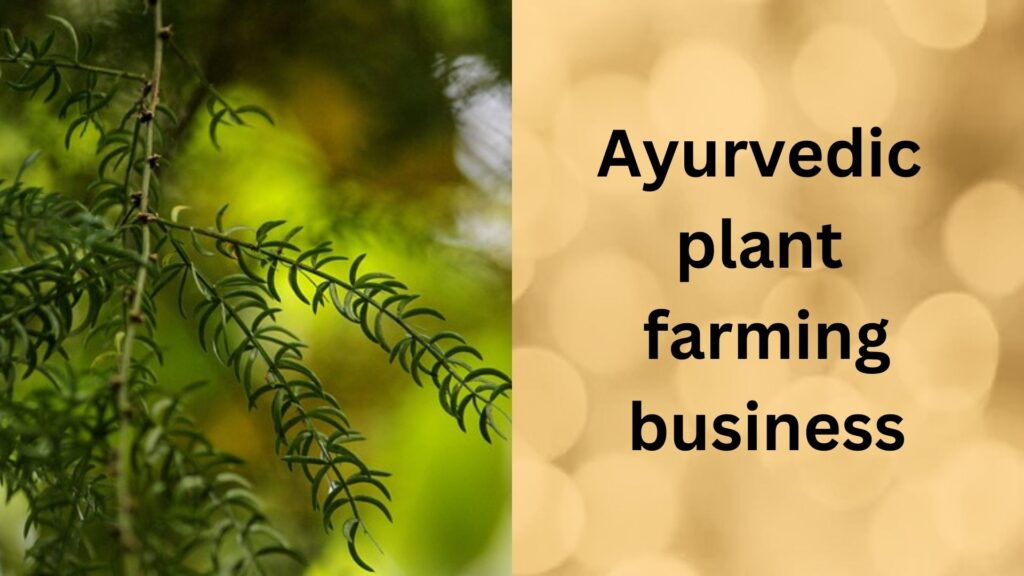
Agro business with Ayurveda Medicine Farming refers to the cultivation of medicinal plants and herbs that are used in Ayurvedic medicine — a traditional Indian system of natural healing. With rising global interest in natural and holistic health solutions, Ayurvedic farming is gaining traction as a profitable and sustainable agricultural alternative.
What Are Ayurvedic Plants?
Ayurvedic plants are herbs and natural substances used in Ayurvedic treatments. Some popular ones include:
- Ashwagandha – for stress and immunity
- Tulsi (Holy Basil) – for respiratory health
- Amla (Indian Gooseberry) – for immunity and digestion
- Neem – for detox and skin care
- Brahmi – for cognitive function
- Turmeric – anti-inflammatory
- Giloy – for immunity and fever
- Shatavari – women’s health
Business Scope:
- Export Potential: Huge global demand, especially from the U.S., Europe, and Southeast Asia.
- Processing Units: Dried herbs, powders, capsules, essential oils.
- Contract Farming: Many pharma and wellness companies offer buyback agreements.
- Value-Added Products: Herbal teas, cosmetics, dietary supplements, oils.
- Cultivation and Sale of raw herbs.
- Herbal Product Manufacturing (oils, powders, syrups).
- Rising among health-conscious consumers globally.
- Increasing use in natural skincare, immunity boosters, and stress relief.
- Supported by India’s promotion of AYUSH (Ayurveda, Yoga, Unani, Siddha,
Income Potential:
- Small Farmers: Income can range from ₹50,000 to ₹2 lakhs per acre annually, depending on the plant and market.
- Value Addition: Processing can multiply profits 2x to 5x.
- Niche Markets: Organic certification boosts income further.
Government Support in India:
- Ministry of AYUSH: Promotes cultivation, processing, and R&D.
- National Medicinal Plants Board (NMPB): Offers subsidies up to 30–75% for selected plants.
- ICAR & State Agri Depts: Conduct training programs.
- Financial Assistance: NABARD and other banks offer loans for herb farming and processing units.
- Export Facilitation: Support for organic certification and international marketing.
Microgreens farming:
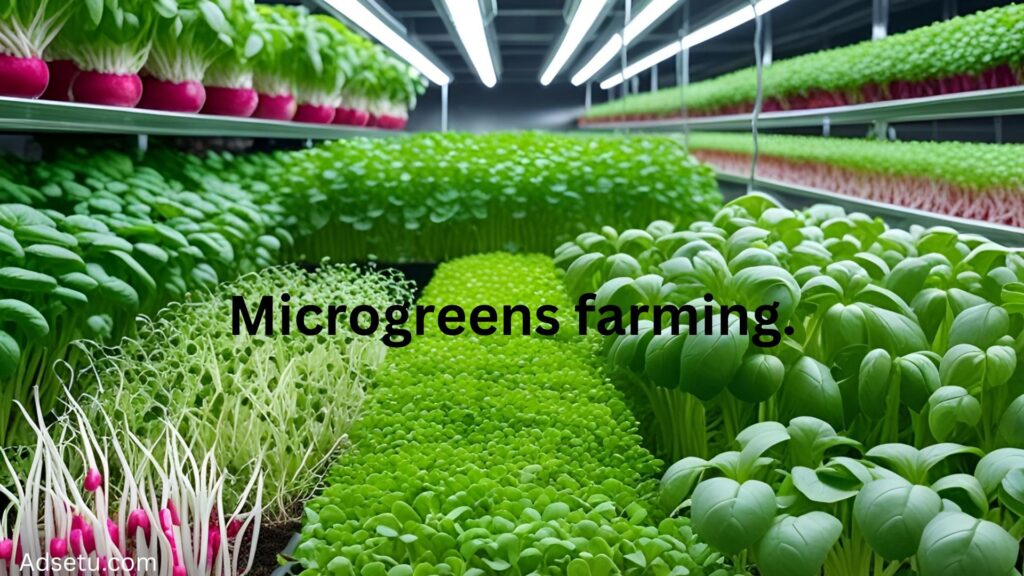
A modern, profitable, and eco-friendly home farming business of microgreens can start even from home.
What are Microgreens?
Microgreens are young, edible greens harvested within 7–21 days of germination, right after the first true leaves emerge. They are nutrient-rich, flavor-dense, and used in gourmet dishes, health drinks, and wellness products.
Importance of Microgreens
- Nutritional Powerhouses: Contain up to 40x more nutrients than their mature counterparts (e.g., broccoli, kale).
- Health Benefits: High in vitamins (A, C, K), antioxidants, and minerals.
- Eco-friendly: Grown with minimal water, space, and no pesticides.
- Quick Yield: Harvest in just 1–3 weeks, ideal for fast ROI.
- Urban Friendly: Can be grown indoors, on rooftops, in balconies, or vertical farms.
Market & Demand
- Growing demand in urban areas due to health trends and wellness diets.
- Chefs and restaurants for garnishing and plating
- Health-conscious individuals and fitness communities
- Smoothie/juice bars and nutritionists
- Export potential to USA, UK, UAE, Singapore, etc.
- Strong demand in metros like Mumbai, Delhi, Bangalore, Hyderabad, etc.
Business Potential
Price of microgreens: ₹300 – ₹2000 per kg depending on type and packaging.
Investment Required:
Can start small with ₹15,000 – ₹30,000.
Income Potential:
- Per tray yield: 100–150 grams.
- 100 trays/month: 10–15 kg = ₹30,000 – ₹60,000 income.
- 500 trays/month: ₹1.5 – ₹3 lakhs+.
Selling price varies by type:
- Broccoli, radish, pea shoots, sunflower: ₹300 – ₹1000/kg
- Basil, kale, arugula, wheatgrass: ₹800 – ₹2000/kg.
Saffron Farming Business:
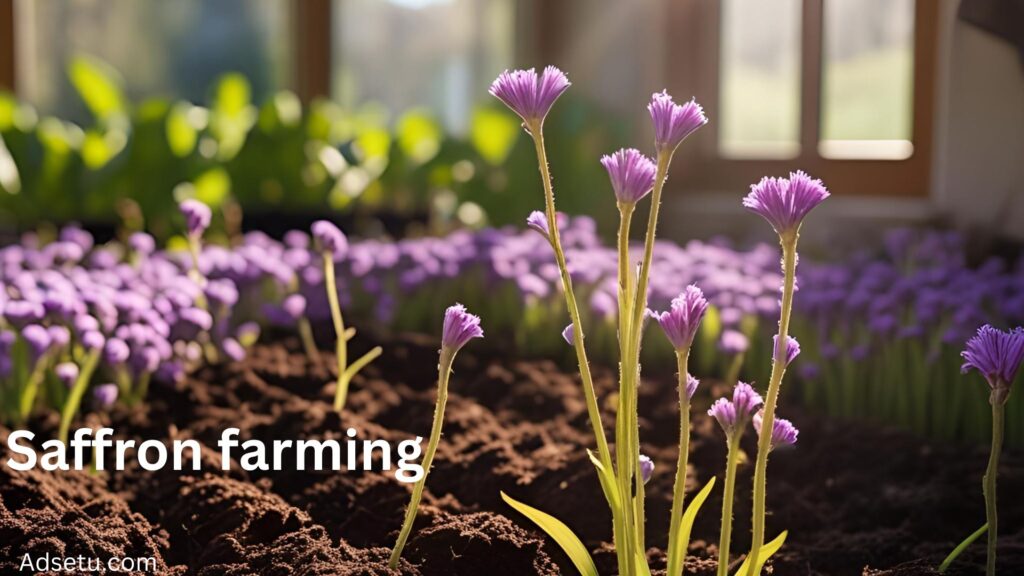
What is Saffron Farming?
- Saffron is a spice derived from the stigmas of the Crocus sativus flower. It is one of the most expensive crops in the world due to the delicate process of harvesting and limited growing regions.
- 1 gram of saffron requires around 150-170 flowers
- Known for its aroma, color, medicinal and culinary uses
Uses of Saffron:
- Food Industry: In sweets, biryani, saffron milk, tea, bakery.
- Ayurveda & Medicine: For skin health, immunity, fertility, mood enhancement.
- Cosmetics: Anti-aging creams, luxury skincare products.
- Religious rituals: In Hindu, Muslim, and Buddhist practices.
- Export: Huge demand in UAE, USA, Europe, China, Japan.
Market Potential:
- India: Major demand from Delhi, Mumbai, Hyderabad, Kerala, Tamil Nadu.
- Global: UAE, Saudi Arabia, USA, Germany, France, and more.
- Price: ₹150–₹250 per gram (even ₹500+ for high-grade saffron).
Selling Options:
- Direct to consumers
- Ayurvedic companies
- Hotels/restaurants
- Online (Amazon, Flipkart, your website)
- Exporters and spice traders
- Business Potential
- Profit margin: 50–70% if marketed directly.
- Great for landowners, farmers, women entrepreneurs, agri-startups.
Infrastructure Required:
- Land: Well-drained, loamy soil; hilly regions preferred (J&K, Himachal, Uttarakhand, NE India).
- Climate: Cool, dry summers & cold winters (ideal temperature: 15–20°C).
- Irrigation: Light drip irrigation; avoid overwatering.
- Storage: Cool, dark place for drying and storing saffron.
- Tools: Basic tools for weeding, harvesting, drying trays.
Support & Govt Schemes (India):
- National Saffron Mission (NSM) – Special programs in J&K.
- NABARD and Agri-loans.
- PM FME & MSME schemes for food businesses.
- Local agri-universities and Krishi Vigyan Kendras (KVKs) offer training.
Hydroponic Farming business:
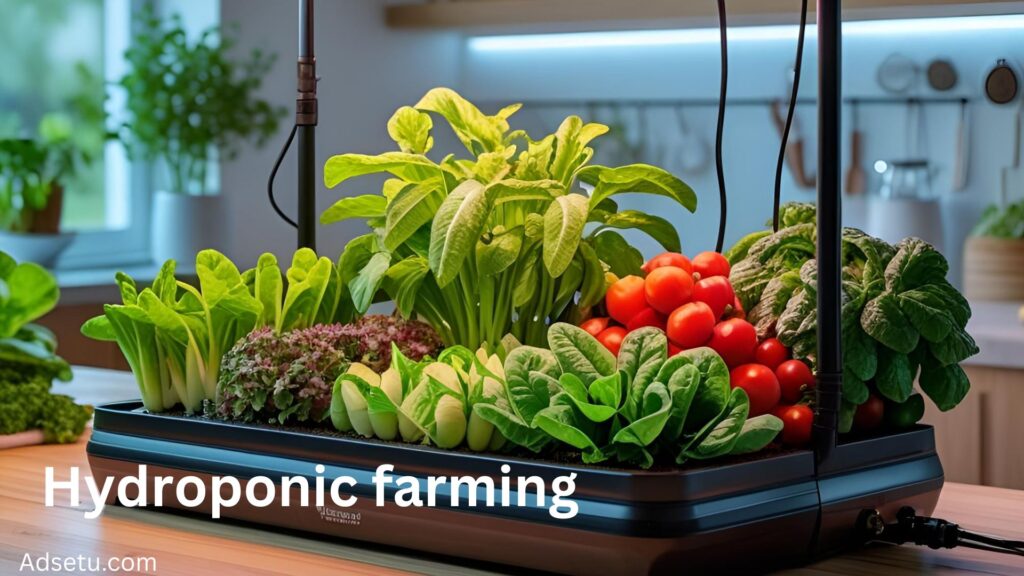
Hydroponic farming is a method of growing plants without soil, using a nutrient-rich water solution to deliver essential minerals directly to the plant roots. This soilless technique is becoming increasingly popular due to its efficiency and sustainability.
Key Features:
- Soilless Growth: Plants are grown in water or inert media like coco peat, perlite, or rockwool.
- Nutrient Control: Growers have complete control over nutrients, pH, and water levels, which leads to faster and healthier plant growth.
- Water Efficiency: Uses up to 90% less water than traditional farming.
- Space Efficiency: Can be done in vertical stacks or urban spaces, making it ideal for cities and areas with poor soil.
Common Crops Grown Hydroponically:
- Leafy greens (lettuce, spinach, kale),Herbs (basil, mint, coriander), Tomatoes,
- Strawberries, Cucumbers, Lettuce (Romaine, Iceberg, Butterhead) ,Spinach,Kale,,
Types of Hydroponic Systems:
- Nutrient Film Technique (NFT): Thin film of nutrient solution flows over roots in a channel.
- Deep Water Culture (DWC): Roots float in a nutrient-rich, oxygenated water solution.
- Drip System: Nutrients drip directly to the base of each plant.
- Ebb and Flow (Flood and Drain): Periodic flooding and draining of nutrient solution.
- Wick System: Passive system where nutrients are drawn up through a wick.
- Aeroponics: Roots are misted with nutrient solution in an air environment (advanced form).
Profitability:
- Yield advantage: Up to 10–15 times more per square meter compared to traditional soil farming.
- Crop cycle: Shorter growth cycles — lettuce and leafy greens in 25–30 days.
Example:
- 1,000 sq. ft. rooftop NFT setup can yield up to 400–600 heads of lettuce per cycle (~30 days)
- Selling at ₹50–₹80 per head, monthly revenue can reach ₹40,000–₹60,000
- After costs (nutrients, electricity, labor), profit can be ₹15,000–₹25,000/month.
Spirulina Farming Business :

What is Spirulina?
Spirulina is a blue-green algae (cyanobacteria) that grows in alkaline water bodies. It is one of the most nutrient-dense superfoods in the world, rich in protein (up to 60–70%), vitamins (B-complex, E, K), iron, calcium, antioxidants like phycocyanin, and essential fatty acids. Spirulina can be consumed as a powder, tablet, capsule, or added to food and drinks.
Uses of Spirulina:
Spirulina has a wide variety of applications:
- Nutritional Supplement: Used in dietary supplements for boosting immunity, energy, and overall health.
- Protein Source: Especially popular among vegans, vegetarians, and athletes due to its high protein content.
- Animal & Aquaculture Feed: Used in poultry, fish, and shrimp feed for growth and pigmentation.
- Cosmetics: Used in skincare products for its anti-aging and detoxifying properties.
- Pharmaceutical Industry: Studied for potential in managing diabetes, cholesterol, and blood pressure.
- Health Beverages & Food Additive: Added in smoothies, juices, chocolates, and health bars.
Infrastructure Required:
To start a Spirulina farming business, you need:
- Open or Covered Space: Flat land with sunlight access. Covered tanks or greenhouses can improve quality and yields.
- Cultivation Tanks: Cement tanks or HDPE-lined pits (3-4 feet deep), filled with nutrient-rich water.
- Water Source: Clean and alkaline water with pH of 8–11. Borewell or filtered water is usually used.
- Aeration Setup: Paddle wheels or air pumps for circulation and oxygenation of the culture.
- Nutrients & Culture Media: Inputs like sodium bicarbonate, urea, potassium salts, and initial Spirulina inoculum.
- Harvesting Setup: Cloth filters, trays, and drying platforms or solar dryers.
- Processing Unit: For drying, pulverizing into powder, and packaging.
- Packaging Materials: Food-grade pouches or bottles for final product.
Raw Materials Needed:
- Spirulina mother culture (starter)
- Sodium bicarbonate, magnesium sulfate, potassium nitrate, urea or alternative organic fertilizers
- Freshwater and controlled pH environment
- Equipment for aeration and filtration
- Packaging material
Profit & Income Potential :
On a small scale (say 1000–2000 sq ft), one can expect monthly yields of around 10–15 kg of dry Spirulina powder. The market price of Spirulina powder ranges from ₹800 to ₹1200 per kg wholesale, and up to ₹2000 per kg retail, depending on quality and branding.
The initial investment can range from ₹1 lakh to ₹3 lakhs for a small setup, and the return on investment may be realized within 1–1.5 years if the marketing and sales channels are in place.
Support & Schemes
Various government schemes under MSME, agriculture, or startup support can be leveraged. NABARD and other agencies sometimes provide grants or low-interest loans. Some agricultural universities and CSIR labs also provide Spirulina culture and training.
Cattle feed business, a profitable agro business :
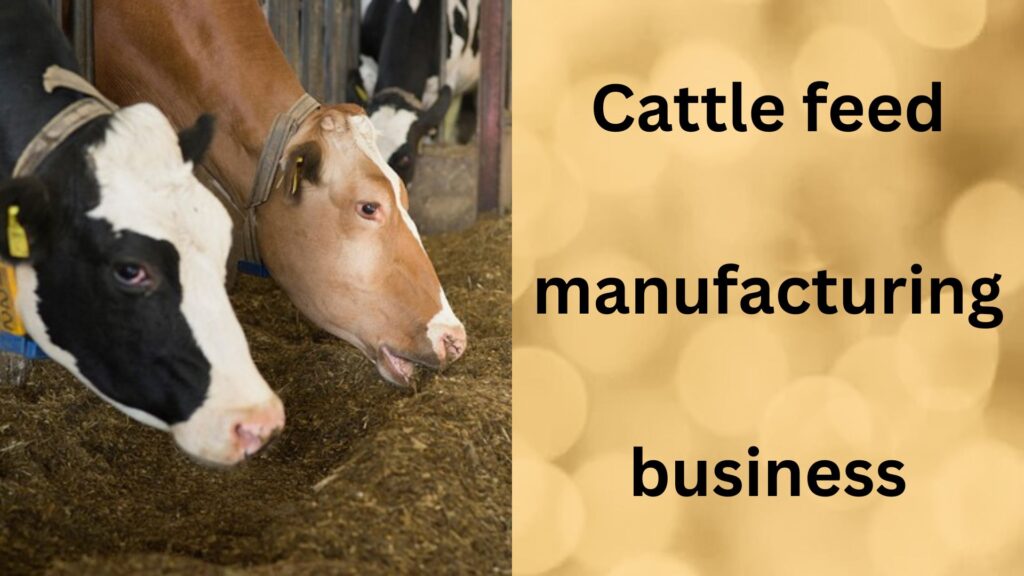
What is Cattle Feed?
Cattle feed, A profitable agro business, is food specifically formulated for the nutritional needs of livestock like cows, buffaloes, and bulls. It typically includes a mix of grains, proteins, vitamins, and minerals designed to boost milk production, growth, and overall health.
Types of Cattle Feed:
- Green Fodder – Fresh grass, maize, sorghum, etc.
- Dry Fodder – Hay, straw, crop residues.
- Concentrate Feed – Grains (corn, wheat), oilseed cakes (soybean, groundnut), bran, etc.
- Mineral Mixtures – Added to feed to provide essential minerals.
- Silage – Fermented green fodder stored in airtight conditions.
- Total Mixed Ration (TMR) – Balanced mix of all feed types in one.
Business Opportunities & Potential:
- High demand due to growing dairy, meat, and poultry sectors.
- Rural areas offer large untapped markets.
- Opportunity to work with dairy cooperatives, farmers, and government schemes.
- Export opportunities in Africa, Southeast Asia.
- Dairy farms
- Government and private livestock farms
- Veterinary centers
- Retailers and wholesalers
- Export markets (Middle East, Africa, etc.)
Income Potential:
- Profit margin: 10% to 25% depending on scale and efficiency.
Government Support:
- NABARD offers subsidies and loans.
- Livestock development programs often promote cattle feed plants.
- Pradhan Mantri Matsya Sampada Yojana and other state-specific schemes may offer incentives.
Cow dung cake business:

Cow dung has been traditionally used in India for fuel, organic manure, and even construction material in rural areas. With rising awareness about sustainability and organic farming, the need for eco-friendly products like cow dung cakes has reemerged strongly.
Need and Relevance:
- Fuel alternative: Cow dung cakes are a cheaper and environmentally friendlier alternative to firewood and coal in rural and semi-urban India.
- Organic farming: With increased demand for chemical-free produce, farmers are turning to organic manure.
- Cultural and religious use: Cow dung cakes are used widely in Hindu rituals, festivals like Diwali, and even daily pujas.
- Eco-friendly construction: Cow dung is sometimes mixed with mud to create plaster for walls and floors in natural building.
- Online marketplace :Urban consumers are increasingly purchasing them online (Flipkart, Amazon, etc.) for spiritual purposes.
- Export potential exists, especially in countries with significant Indian diaspora.
Business Opportunities:
- Cow dung can be processed into several high-demand products:
- Traditional cow dung cakes (handmade or machine-pressed).
- Biofertilizer and compost for organic farms.
- Biogas production, which provides energy and slurry (a fertilizer).
- Cow dung logs as an eco-friendly cremation fuel alternative.
- Eco products like incense sticks, diyas, and idols made from cow dung.
- Cow dung paper or handicrafts as a niche eco-friendly product line.
Profitability:
- Profit margins can be attractive, especially if the raw material is low-cost or free:
- Cost per cow dung cake: ₹1–2 (including labour and packaging)
- Selling price: ₹5–10 per cake in urban or online markets.
- Bulk sales: To temples, farmers, or online platforms can fetch higher cumulative revenue.
A small unit producing 500 cakes/day could earn net profits of ₹30,000–₹50,000/month depending on market reach and product mix.
Moringa Powder manufacturing business:

Moringa powder is made by drying and grinding of the leaves and seeds of the Moringa oleifera tree, also known as the “drumstick tree” or “miracle tree.” It is a superfood rich in vitamins, minerals, antioxidants, and essential amino acids, making it highly beneficial for health and wellness.
Need and Importance of Moringa Powder
- Nutritional Powerhouse – Contains vitamins A, C, E, calcium, potassium, and protein.
- Boosts Immunity – High in antioxidants, which fight inflammation and infections.
- Supports Digestive Health – Rich in fiber, aiding digestion and gut health.
- Manages Blood Sugar & Cholesterol – Helps in diabetes and heart health.
- Weight Management – Boosts metabolism and supports fat loss.
- Sustainable & Fast Growing – Moringa is drought-resistant and grows easily.
- Medicinal Uses of Moringa Powder
- Anti-inflammatory – Reduces joint pain and arthritis symptoms.
- Diabetes Management – Lowers blood sugar levels naturally.
- Liver Detoxification – Protects and repairs liver damage.
- Improves Brain Health – Enhances memory and reduces stress.
- Antibacterial & Antifungal – Fights infections and improves skin health.
Business Opportunities in Moringa Powder Production
- The global moringa powder market is expanding due to its health benefits, and demand is rising in:
- Nutraceutical & Supplement Industry – Capsules, tablets, and powders.
- Food & Beverage Sector – Used in smoothies, energy bars, teas, and herbal drinks.
- Cosmetics & Skincare – Added to creams, soaps, and hair products.
- Ayurvedic & Herbal Medicine – Used in traditional medicine formulations.
- Export Market – High demand in USA, Europe, Middle East, and Asia.
- E-commerce & Retail – Sold as organic or packaged powder in supermarkets and online stores.
Machinery Required for Moringa Powder Production
- Leaf Drying Machine – Hot air or solar dryer to remove moisture.
- Grinding/Pulverizing Machine – Converts dried leaves into fine powder.
- Sieving Machine – Ensures uniform particle size.
- Packaging & Sealing Machine – Vacuum or nitrogen-sealed pouches for long shelf life.
- Labeling & Weighing Machine – For branding and packaging compliance.
- Cold Storage (Optional) – For storing fresh leaves before processing.
Market Potential & Income in India and Worldwide
- The global moringa products market is expected to reach $10+ billion by 2028, growing at 8-10% CAGR.
- India is one of the largest producers, exporting to the USA, Germany, UAE, Japan, and Africa.
- Domestic demand is rising due to growing health awareness and Ayurveda trends.
Potential Income:
- Profit Margins – 40-70%, depending on raw material sourcing, branding, and market.
- Small-scale businesses can earn ₹50,000 – ₹2,00,000 per month.
Government Support & Subsidies
- National Medicinal Plants Board (NMPB) – Support for moringa farming & processing.
- PM Formalization of Micro Food Processing Enterprises (PMFME) Scheme – Grants & loans.
- Agricultural & Export Promotion Schemes – Assistance for exports under APEDA.
- Mudra Loans for MSMEs – Up to ₹10 lakhs for small businesses.
Powdered Vegetables business:

Powdered vegetables are made by dehydrating fresh vegetables and grinding them into fine powders. These powders retain the nutrients and flavors of fresh vegetables while having a longer shelf life and being easy to store and use. Common vegetable powders include onion, garlic, tomato, spinach, beetroot, carrot, ginger, and mushroom powder.
Need and Importance of Vegetable Powders
- Extended Shelf Life – Vegetable powders last for months without refrigeration.
- Convenience – Easy to use in cooking, beverages, and food processing.
- Space-Saving Storage – Reduced volume compared to fresh vegetables.
- Reduced Waste – Minimizes post-harvest losses of perishable vegetables.
- Consistent Availability – Seasonal vegetables can be consumed year-round.
- High Nutritional Value – Retains essential vitamins, minerals, and antioxidants.
- Growing Demand – Used in health foods, baby food, soups, sauces, and instant meals.
Business Opportunities in Vegetable Powder Manufacturing
- The demand for vegetable powders is rising in:
- Food & Beverage Industry – Used in soups, seasonings, and sauces.
- Health & Wellness Sector – Added to smoothies, dietary supplements, and baby food.
- Horeca (Hotels, Restaurants, Cafes) – Used in instant food preparation.
- Export Market – High demand in countries like the USA, UAE, and Europe.
- E-commerce & Retail – Sold in packaged form via online platforms and supermarkets.
Required Infrastructure
- Raw Material Storage – Fresh vegetables require pre-processing.
- Pre-processing Equipment – Washing, peeling, and slicing machines.
- Drying Equipment – Hot air dryer, freeze dryer, spray dryer (for high-end powders).
- Grinding & Pulverizing Unit – Converts dried vegetables into fine powder.
- Packaging & Sealing Unit – Vacuum sealing, nitrogen flushing for freshness.
- Cold Storage (Optional) – For storing raw vegetables before processing.
- Quality Control & Testing Lab – Ensures hygiene, safety, and nutrient retention.
- Logistics & Distribution – Supply chain management for retail and bulk sales.
Potential Income & Profitability:
- Profit margins range from 30-60%, depending on raw materials, drying methods, and market demand.
- Small-scale businesses can earn ₹50,000 – ₹2,00,000 per month.
Government Support & Loan Schemes
- PM Formalization of Micro Food Processing Enterprises (PMFME) Scheme
- Mudra Loans for MSMEs
- Subsidies under the Ministry of Food Processing Industries (MoFPI).
Dehydration of Vegetables:
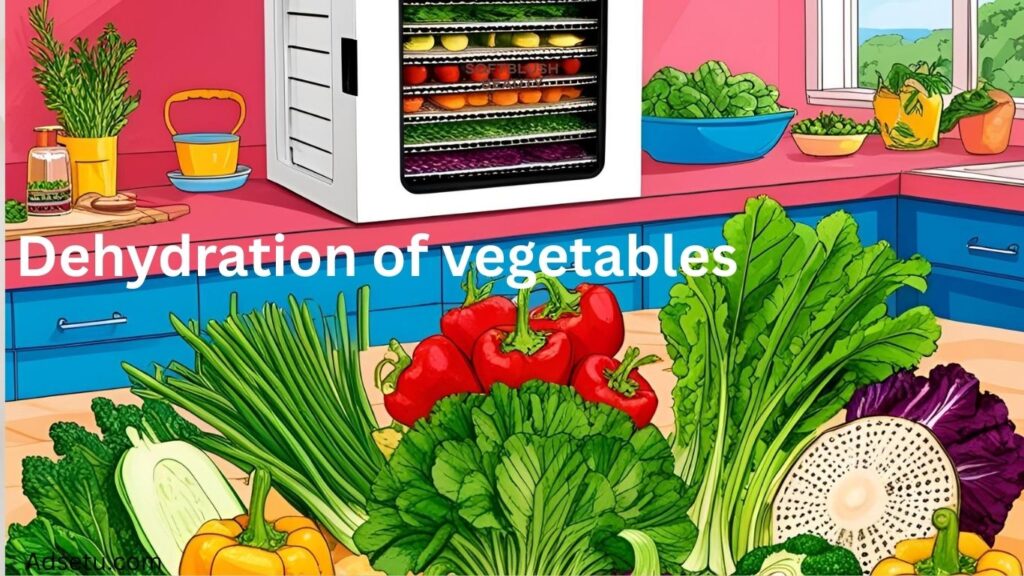
Dehydration of vegetables is the process of removing moisture from fresh vegetables to extend their shelf life, reduce weight and volume for storage and transportation, and maintain their nutritional value. This is achieved using methods like sun drying, hot air drying, freeze drying, and vacuum drying.
Need and Importance of Dehydration
- Prevents Spoilage – Reduces microbial growth and enzymatic reactions that cause decay.
- Increases Shelf Life – Can last months or years without refrigeration.
- Reduces Wastage – Helps prevent post-harvest losses, especially during peak seasons.
- Easy Storage & Transport – Lighter weight and compact size make transportation and storage more efficient.
- Retains Nutritional Value – Proper dehydration retains essential vitamins and minerals.
- Adds Value to Produce – Creates economic opportunities for farmers and entrepreneurs.
Business Opportunity in Vegetable Dehydration
- Dehydrated vegetables are in high demand in industries such as:
- Food Processing (soups, ready-to-eat meals, instant foods)
- Horeca (Hotels, Restaurants, Cafes)
- Export Market (Middle East, Europe, USA)
- Retail (Supermarkets, E-commerce)
Some popular dehydrated vegetables include onions, tomatoes, carrots, spinach, garlic, and green peas. The demand is growing due to changing lifestyles and the increasing preference for ready-to-cook ingredients.
Required Infrastructure
- Raw Material Storage – For fresh vegetables before processing.
- Pre-processing Equipment – Washing, peeling, slicing, blanching machines.
- Dehydration Unit – Solar dryers, hot air dryers, or freeze dryers.
- Packaging Unit – Vacuum sealing, nitrogen flushing for extended freshness.
- Cold Storage (Optional) – For raw vegetables before dehydration.
- Quality Control & Testing Lab – To ensure hygiene and nutritional standards.
- Logistics & Distribution – For transport and supply chain management.
Investment:
- Small Scale (Home-based/Small Unit) – ₹2-5 lakhs
Potential Income & Profitability:
- Profit margins range from 20-50%, depending on the vegetable, processing technology, and market.
- Small-scale businesses can earn ₹50,000 – ₹2,00,000 per month.
Government Support & Loans
- PM Formalization of Micro Food Processing Enterprises (PMFME) Scheme
- Mudra Loans for MSMEs
- Subsidies under the Ministry of Food Processing Industries (MoFPI)